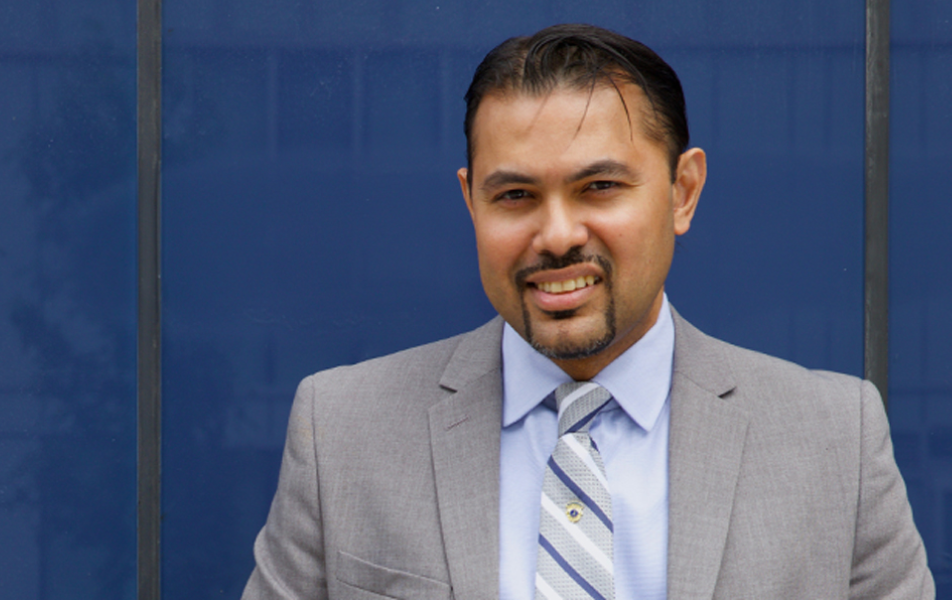Cultivating Equitable and Ethical Leadership Skills
The GCE: Leadership in Social Justice helps leaders become agents of change by teaching them to develop policies and practices that foster equity, diversity, inclusion, and decolonization (EDID) in their professional contexts.
With a focus on cultivating equitable and ethical leadership, the curriculum focuses on developing work cultures that reflect social consciousness and commitment to inclusive spaces.
Graduates of the GCE: Leadership in Social Justice are equipped to be the pioneers, safekeepers, and advocates of socially responsible and equitable organizational policies as they bring about a cultural shift within their organizations.

18
Students per class
100
%
Online and Asynchronous
New Term Starts Soon
Starts:
September
Campus:
Fully Online
Duration:
As few as 10.5 months*
*With full course load, year-round study and/or approved transfer credits. Contact an Admissions Advisor for more information.
Program Benefits
Career Outcomes
Graduates of the GCE: Leadership in Social Justice are equipped to be the pioneers, safekeepers, and advocates of socially responsible and equitable organizational policies and programs, in areas such as:
-
Public Service
-
Private Organizations
-
Not-for-Profit
-
Healthcare
-
Social Work
-
Armed Forces
-
K-12 Equity Champions
-
Organizational Development
-
Human Resources
-
Higher Education
Faculty
Meet the Dean

Dr. Karen Edge
Dean, Faculty of Education
Dr. Karen Edge joined Yorkville University in September 2025. Previously, Karen held a faculty appointment at UCL Institute of Education (“IOE”) in London, UK for 20 years. At IOE, Karen led various programmes including the MA Leadership and MBA Educational Leadership (International). Karen also served as head of International Partnerships in the IOE Doctoral School. As UCL’s Pro-Vice Provost (International), Karen co-led and championed the implementation of UCL’s international strategy including co-chairing UCL’s strategic partnership with a Canadian university and the Global Research Forum within UCL.
As an academic leader, Karen creates opportunities for all stakeholders to engage in ways that are personally and professionally rewarding. She is known as an effective champion for colleagues and students who blends keen strategic insight with kindness and transparency. She is a celebrated teacher, receiving multiple nominations for teaching awards for her innovative and inclusive practice.
Karen’s research expertise and contributions rest in the broad areas of educational leadership, equality and diversity, international collaboration generational theory, and system-level change through initiatives like the Global City Leaders Project. Awarded over CDN $1.8 million, Karen’s research spans 35+ countries and has engaged over 100 global research colleagues, and 75 expert academic, policy and practice advisory board members.
She is also a sought-after keynote speaker and workshop leader, where she is widely recognised for her ability to fuse theory, practice and humour with memorable take-home messages and evidence-driven tools. As a result, Karen has delivered 100s of academic and professional keynotes in over 25 countries. She also received the UCL IOE Director’s Prize for Public Engagement (2015) and became a Salzburg Global Fellow (2022).
Karen holds a PhD in Educational Administration and Master of Arts (Higer Education) from the Ontario Institute of Studies in Education/University of Toronto. She earned her BSc in Biology and Environmental Science from Western University.
Karen has long admired the innovation and strength of the Faculty of Education and is excited to work alongside colleagues and students. She is returning to Canada joining Yorkville after relocating from London, UK. She is eager to play a key role within the university and looks forward to collaborating with sector partners for the benefit of the faculty, university and wider education systems.
Meet the Faculty
Admission Requirements
Yorkville University’s GCE: Leadership in Social Justice is offered 100% online.
The program is administratively offered out of Fredericton, New Brunswick.
Applicants to the GCE: Leadership in Social Justice are required to provide the following:
- Official undergraduate transcript and proof of obtainment of a bachelor’s degree*
- Resume and statement of interest
- Detailed course descriptions if applying for transfer credits
- Two letters of reference from professional or academic sources
- Completed online application
- Application fee of $150 (CAD)
*All official transcripts need to be sealed, stamped and sent directly from the issuing institution to our Admissions Services Department for evaluation.
In addition, applicants are required to have:
- A cumulative grade point average (CGPA) in undergraduate study of at least 3.0 on a 4.0 or 4.3 scale, or a GPA of at least 3.0 in the final 60 undergraduate credits taken. Applicants may be conditionally admitted with a GPA between 2.5 and 2.99 if strength of overall application is sufficient.
Applicants who do not meet the standard admissions requirements may be considered for admission under the Faculty of Education’s Flexible Admissions Policy. Yorkville University reserves the right to refuse admission or ask admitted students to withdraw from the program in special circumstances.
For full details of admissions requirements, please see the Academic Calendar.
To fill out the details of your reference for admission to our GCE: Leadership in Social Justice, click here.
English Language Requirements
English is the primary language of instruction at Yorkville University.
Applicants who have obtained a bachelor’s or first professional degree in a language other than English are required to submit confirmation of an official test of ability to work and study in English:
- Proof of obtaining any other degree at the post-secondary education level where the primary language of instruction was English.
- Confirmation of a Canadian Academic English Language – Computer edition (CAEL-CE) with a score of at least 70 (No component proficiency score below 60).
- Confirmation of an official Test of English as a Foreign Language (TOEFL) score of 95 (Internet-based version).
- Confirmation of a Canadian Language Benchmark (CLB) overall score of 9 (No component score below 8).
- International English-Language Test System (IELTS) with an overall bandwidth of 7.0.
- Confirmation of a Canadian Test of English for Scholars and Trainees (CanTest) with a minimum overall bandwidth of 4.5.
- Confirmation of a score on any other test of English language proficiency that equates to Level C1 or higher of the Common European Framework of Reference for Languages (CEFR).
- Confirmation of a score equivalent to these scores on another test of English language proficiency recognized by and acceptable to the University.
- Confirmation of a Duolingo minimum score of 130 (No subscore below 120).
- Confirmation of Pearson Test of English (PTE) Academic score of 65 (no skills area score below 55)
Canadian applicants who completed their qualifying bachelor’s degree in French, but completed another post-secondary degree, certificate, or diploma or their secondary education in English, are exempted from the requirement to provide tested confirmation of English language proficiency.
The University reserves the right to refuse admission to any student whose proficiency of English is questionable and to ask any student whose written work is below acceptable standards to withdraw from the program.
Any questions? Please contact an Admissions Advisor.
Tuition and Fees
Total Cost (including Application Fees) is $11,850*
*Note: Total program cost may be reduced when applying applicable transfer credits. Costs below assumes full program cost without applicable transfer credits applied. The cost does not include textbooks, expendable supplies, equipment, and resource fees. To understand your specific program cost, please speak with an advisor.
- GCE Tuition: $11,700
- Cost per credit: $780
- Program cost includes $300 seat fee and $150 application fee
- $300 Seat Fee is deducted from Student’s first tuition payment
- The academic year of the GCE: Leadership in Social Justice is comprised of 2.5 academic terms of 15 weeks in length each, beginning in September.
Assuming an average course load, tuition cost per term is $4,680
By selecting to take more or fewer courses per term, costs will be updated accordingly.
A typical course is 3 credits. Students must complete 15 study credits to graduate.
Term
Credits
Cost Per Credit
Fees
01
6
$780
$4,680
02
6
$780
$4,680
03
3
$780
$2,340
TOTAL
15
$780
$11,700
*As of September 2023. Please note that tuition and fees are subject to change.
Tuition Payment and Rate Information
Changes to tuition rates will be announced at least three months before the start of the term to which they apply.
Arrangements for payment of tuition must be made at least two weeks before the start of each term (please see the Academic Schedule for deadlines). Monthly payment arrangements can also be made.
For further information about tuition, fees and payment methods, please contact Yorkville University’s Bursar’s Office at 1-888-886-1882.
Please contact an Admissions Advisor to learn more about financial aid options.
Program Description
We recognize the diverse aspirations of our students and offer two pathways: course-based for those focused on professional learning outcomes and research-based for passionate researchers and doctoral candidates. To make the program truly individualized, students can take any of our available M.Ed. elective courses, irrespective of their chosen specialization or pathway.
Master of Education in Adult Education
| Course-based Pathway | Research-based Pathway |
|---|---|
| EDAE 6323: Foundations of Adult Education | EDAE 6323: Foundations of Adult Education |
| EDUC 6013: Research in Education | EDUC 6013: Research in Education |
| EDAE 6303: Contexts of Adult Learning | EDAE 6363: Diversity in Adult Education |
| EDUC 6123: Reflexive Inquiry | EDUC 6093: Advanced Research Methods in Education |
| EDAE 6363: Diversity in Adult Education | EDUC 7000: Graduate Research Thesis |
| EDAE 6343: Program Development and Planning | Plus 2 Electives (6 Credits) |
| EDUC 6083: Self-directed Inquiry | |
| Plus 3 Electives (9 Credits) |
Master of Education in Educational Leadership: Educational Administration
| Course-based Pathway | Research-based Pathway |
|---|---|
| EDEL 6113: Educational Leadership: Perspectives and Practices | EDEL 6113: Educational Leadership: Perspectives and Practices |
| EDUC 6013: Research in Education | EDUC 6013: Research in Education |
| EDUC 6063: Assessment and Evaluation in Education | EDEL 6193: Diversity and Leadership |
| EDUC 6123: Reflexive Inquiry | EDUC 6093: Advanced Research Methods in Education |
| EDEL 6193: Diversity and Leadership | EDUC 7000: Graduate Research Thesis |
| EDEL 6223: Supervision of Instruction | Plus 2 Electives (6 Credits) |
| EDUC 6083: Self-directed Inquiry | |
| Plus 3 Electives (9 Credits) |
Master of Education in Educational Leadership: Leadership in Learning
| Course-based Pathway | Research-based Pathway |
|---|---|
| EDUC 6043: Learning and Organizations | EDUC 6043: Learning and Organizations |
| EDUC 6013: Research in Education | EDUC 6013: Research in Education |
| EDEL 6193: Diversity and Leadership | EDEL 6193: Diversity and Leadership |
| EDUC 6123: Reflexive Inquiry | EDUC 6093: Advanced Research Methods in Education |
| EDEL 6153: Ethical Leadership | EDUC 7000: Graduate Research Thesis |
| EDEL 6143: Change and Transformation | Plus 2 Electives (6 Credits) |
| EDEL 6083: Self-direct Inquiry | |
| Plus 3 Electives (9 Credits) |
Graduate Certificate in Education: Teaching and Learning
| GCE: Teaching and Learning |
|---|
| EDAE 6323: Foundations of Adult Education |
| EDAE 6343: Program Development and Planning |
| EDUC 6063: Assessment and Evaluation in Education |
| EDAE 6513: Becoming a Critically Reflective Educator |
| 1 Elective |
Graduate Certificate in Education: Leadership in Social Justice
| GCE: Leadership in Social Justice |
|---|
| EDUC 6003: Indigenous Perspectives in Canadian Education |
| EDEL 6153: Ethical Leadership |
| EDCP 6443: Curriculum as Living Inquiry |
| EDEL 6193: Diversity in Leadership |
| 1 Elective |
Course Descriptions
Students must complete the 15-credit requirement to graduate by completing the four required courses (Indigenous Perspectives in Canadian Education, Ethical Leadership, Curriculum as Living Inquiry, and Diversity and Leadership) and any one of the elective courses. The rigorous curriculum of the GCE: Leadership in Social Justice includes the following courses:
3 Credits
Indigenous Perspectives in Canadian Education introduces students to the history of Indigenous education in Canada, Indigenous pedagogies and epistemologies, decolonization in education, while encouraging students to think about their own roles in reconciliation through the lens of education. Through selected readings, weekly discussions, and assignments, students will develop a greater understanding of the traditional, historical, and contemporary roles of education in the lives of Indigenous Peoples in Canada. Because the course readings include studies that draw upon Indigenous or Indigenous-informed methodologies, students will also be introduced to some ways that Indigenous methodologies are used in educational research.
3 Credits
Ethical Leadership uses tenets of critical pedagogy and ethics to help students develop as critically conscious leaders guided by the notion that education can simultaneously foster the cultivation of intellect and a commitment to socially just practices.
3 Credits
Curriculum as Living Inquiry introduces students to curriculum as dynamically re/conceptualized and relationally understood. Drawing from both foundational and current scholars, students will differentiate between curriculum as plan and curriculum as process as they explore the notion of currere, interrogate hidden curriculum, and investigate those made invisible by curriculum. The roles of self and self-in-relation are central considerations as students from diverse education contexts explore various approaches to including lived experience in curricular initiatives or program planning.
3 Credits
Diversity and Leadership uses selected readings, weekly discussions, and assignments, to help students develop a greater understanding of diversity as a social construction in relation to the concepts of social identity and social location. The specific areas of diversity included in this course are: identity and intersectionality; privilege and power; race and ethnicity; gender and sexual orientation; multiculturalism; inclusiveness and universal design for learning; and globalization and leadership.
3 Credits
Administrators as Leaders focuses on developing leadership and managerial skills in school administrators. Particular attention is given to instructional leadership, developing clear, compelling, shared, and supported visions, and encouraging cultures of ongoing learning and professional development.
3 Credits
Educational Leadership: Perspectives and Practices is a foundational course that is attentive to the ways theoretical knowledge and applied practice can inform each other. A prerequisite for further studies in the field, it explores major theoretical perspectives on leadership in relation to current practices in educational administration and leadership.
3 Credits
Change and Transformation prepares students to successfully manage and champion personal, professional, and organizational change. Collaborative and interest-based approaches are foundational as are discussions of dynamic change theory and the avoidance of change fatigue.
3 Credits
Supervision of Instruction introduces students to various institutional settings for instructional supervision as well as supervisory techniques that support professional development.
3 Credits
Leadership and Community Engagement teaches students to engage a range of community stakeholders in ways that benefit all those with vested interests. Identifying leaders as integral to this process, this course focuses on the complexities of community engagement and the various forms this engagement might take. The skills required of successful leaders of community engagement are explicitly connected to critical reflection and thoughtful praxis. Particular attention is given to students developing their own leadership capacity to strengthen professional connections within their K-12 school communities and/or community-based non-profit organizations. The course name for EDEL6433 will appear on Transcript and Term Record as Stakeholder Engagement for students who have taken this course prior to April 30, 2021.
3 Credits
Leadership in Higher Education encourages students to develop the skills, knowledge, and innovative thinking that is required of leaders within various post-secondary contexts. Under the impacts of internationalization and 21st century technological advances, individuals in multi-faceted leadership positions across colleges and universities are being challenged to consider emerging models of leadership and their implications for the design and organization of post- secondary educational environments. The specific areas of leadership in higher education included in this course are: strategic planning; communication, collaboration, and partnership development (within and beyond the institution); leadership commitment to diversity; supporting intellectual curiosity; recruitment, retention, and student support; financial leadership; change leadership and crisis management.
3 Credits
Leadership and Online Pedagogies prepares students to lead educators and instructional teams in online settings. Designed for current and aspiring leaders in K–12 education, higher education, and organizational training, this course explores the core elements of effective online program leadership: strategic program development, evidence-based design and teaching practices, and decision-making around emerging technologies. Through case studies and problem-of-practice discussions, students will examine challenges in digital equity, policy formation, professional learning, and data-informed organizational change. Anchored in organizational learning and leadership theory, the course equips participants to guide their institutions through rapid technological and pedagogical shifts with an emphasis on innovation, accessibility, and inclusion.
3 Credits
Research in Education introduces students to different research approaches, including quantitative, qualitative, mixed methods, arts-based, and community-based participatory research. The primary focus of this course is to help students understand research terminology, critically evaluate published research, and develop an understanding of different methodologies that are best suited for investigating different types of research questions. Research methods, information gathering strategies, and analysis procedures are also explored.
Action Research provides students with an in-depth study of the action-oriented ways adult educators, teachers and educational leaders can systematically examine their own practices. Emphasis is placed on developing skills related to research focus, project design, information gathering, and interpretation. This course is grounded in reflexive practice.
(3 credits) (elective)
3 credits
Learning and Organizations provides an opportunity for students to examine the emergence of the learning organization and explore ways to build sustainable learning dynamics and foster spaces where people flourish. Attention will be given to the ways knowledge management and technology help organizations become learning organizations.
3 Credits
Assessment and Evaluation in Education allows students to explore various diagnostic, formative, and summative methods from both theoretical and practical perspectives. Students will learn how to develop and use assessment to promote student learning within a positive knowledge-curation culture (i.e., classroom, department, working unit, etc.). A focus on how to build efficacious and self-regulated learners through pedagogical assessment strategies that utilize accurate and ethical interpretation will be a focus. Students will also explore and differentiate between assessment and evaluation principles for both individual and program performance. A final culminating learning experience will be to reflect upon an assessment and evaluation of architecture that aligns to an area of professional interest.
3 Credits
(prerequisite completion of first 9 courses in program of study) Self-Directed Inquiry is designed to be the culmination of the Master of Education journey for students in the course-based pathway. It requires students to explore a specific area of research interest relevant to their field and to the designation that they are seeking. With the support of teaching faculty and each other, students will engage in discussions and assignments that support self-directed professional inquiry and their own professional learning. As such, students will focus equally on the demonstration of two competencies: conceptualizing, designing, and presenting a research inquiry that evidences criticality and creativity, individualized expression, and capacity to inform praxis; and the ability to communicate effectively at a level commensurate with graduate education. Not available as an elective in research-based program streams.
3 Credits
(prerequisites: completion of first 5 courses in program of study and cGPA of 3.70 or higher)
Advanced Research Methods in Education encourages students to explore the broad and deep possibilities for inquiry within critical, community-based, arts-integrated, qualitative, and quantitative research. Connecting rigour to researcher consciousness through reflexive inquiry, students will begin to think about situating themselves theoretically (ontologically, epistemologically, and methodologically) in the context of potential research topics of interest. Engaging with scholarly discourse and critical dialogue, students will extend their capacities from evaluating published research to preparing to conceptualize, conduct, and analyze their own research. Not normally available as an elective in course-based program streams.
3 Credits
Reflexive Inquiry begins from the notion that our lived experiences inform the ways we come to knowledge just as they influence how we engage with each other and the world. In providing students with an opportunity to examine the space between binaries like theory/practice, self/other, and teacher/learner, this course engages dialogic inquiry to cultivate social consciousness, foster accountability, and support ongoing professional development. Students are offered a range of assessment choices, including traditional academic essay, orality, visual curation, technology-based, and arts-informed evaluation.
3 Credits
Decolonizing and Indigenizing Curriculum, Teaching, and Learning guides students to deconstruct colonial ideologies and dismantle structures that perpetuate privileging Western thought and approaches. In seeking to surface pedagogical biases that impact Indigenous ways of being, students learn to develop programs of study, curricula, and services that include Indigenous knowledges, perspectives, values, and cultural understandings in pedagogy, policy and daily practice.
3 Credits
Indigenous Pedagogies and Ways of Knowing examines Indigenous systems of teaching and learning from the perspective of Indigenous education, scholarship and research, and Indigenous knowledge holders and community members. Learners will gain deeper level understanding of the critical significance of orality, storytelling, Indigenous languages, Indigenous literature and Indigenous arts to curricula and programs of study. Holistic and lifelong learning, experiential, land and place-based, trauma-informed, and strengths-based pedagogies will be explored from within an intercultural ethical space of Indigenous relationality. Educators are encouraged to identify and create alternative approaches to facilitate and strengthen access and inclusion of Indigenous pedagogies and ways of knowing into instructional methods, evaluation, and assessment, in systems of education in school, classroom and community environments.
3 Credits
Educators will explore building and strengthening of relationships in Indigenous education at the intersection of Indigenous, settler and immigrant knowledge and experience. Individual and collective roles, attitudes and behaviours, responsibility and representation are examined in the context of processes of colonization, decolonization and resurgence, hegemony, power and privilege, access, inclusion, and accountability, in systems of education. Guided by Indigenous principles and reconciliation framework, students will engage and collaborate in processes of envisioning decolonization and Indigenization within an ethical space of Indigenous relationality to build authentic respectful intercultural relationships in education curricula, programming, and policy.
3 Credits
Contexts of Adult Learning introduces students to the contexts of adult education and investigates what it means to be learning in a number of different contexts. The situational aspect of learning will be central to the enquiry and students will take a close look at formal, informal and open learning, networked learning, experiential, simulation, and place-based learning, community-based learning, learning in communities of practice; and learning in communities of interests. These learning contexts will lead students not only to social learning theory, with a particular focus on the local community, the workplace, the home, the voluntary sector, but also to theories of self-direction and connectivism as might be most obvious in relatively new online learning spaces. Students will explore how the learning and knowledge-generating capacities of such spaces will affect their success.
3 Credits
Foundations of Adult Education presents an overview of the major societal purposes of adult education by exploring and examining the conceptual, historical, and philosophical foundations that inform current practices in the field. Students are encouraged to examine the relationship between theory and practice, and to identify their own ideas and practices in relation to these theories and practices.
3 Credits
Program Development and Planning provides a theoretical and conceptual foundation in contemporary approaches to program development and planning for adult learners. Students apply newly acquired knowledge and skills in designing a program. Topics include: designing and developing programs; assessing needs; setting learning objectives and outcomes; designing instructional plans; and developing evaluation strategies.
3 Credits
Diversity in Adult Education addresses how adult education programs understand and respond to different cultural contexts. Through selected readings, weekly discussions, and assignments, students will develop a greater understanding of diversity as a social construction in relation to the concepts of social identity and social location. The specific areas of diversity included in this course are: identity and intersectionality; privilege and power; race and ethnicity; gender and sexual orientation; Indigenous knowledge; inclusiveness and universal design for learning; and globalization and adult learning.
3 Credits
Learning and Teaching Online explores the theory underlying the development and application of new interactive educational technologies, how they might fit with instructional design, learning and assessment strategies, and infrastructures. The course provides hands-on experience with a range of learning technologies and enables students to explore the processes of designing, implementing, and critiquing technology-based learning. The course will introduce students to current debates around the concept of openness. By the end of the course, students will have developed the ability to act as creative and critical professionals within the broad field of technology-based learning, teaching, and training.
3 Credits
Transformative Learning in Adult Education involves an examination of transformative learning. This course will help students to understand what transformative learning is, distinguish it from other forms of learning, and foster it in their practice. The course will cover five broad areas: history, theory, research, practice, and future perspectives of transformative learning.
3 Credits
This course involves the examination of a variety of teaching and facilitating approaches that enhance the adult learning experience in individual or group settings. Topics include: teaching styles; creating motivating learning environments; ethical concerns in teaching adults; guidelines for selecting teaching methods; the use of technologies for teaching; and the assessment of teaching performance.
3 Credits
Adult Education for Sustainability and Global Citizenship is designed to provide students with the knowledge and skills to integrate with depth and creativity the principles of sustainability and global consciousness into classrooms, colleges, and community contexts. Students will explore sustainable development and global citizenship to understand their alignment with adult education theory and practice, in particular affective and dialogic learning, inclusivity, and systemic thinking.
3 Credits
Coaching and Mentoring in Adult Education will introduce students to coaching and mentoring strategies that they can utilise in their workplaces. Students will learn about the underlying theory as well as explore current models. They will also be encouraged to reflect on what coaching and mentoring strategies may work best for them and their organisation. This course will aid students in helping others toward continuous professional development.
Related Programs

M.Ed. in Curriculum and Pedagogy
Design inclusive, innovative learning experiences across K-12, higher education, nonprofits, and corporate settings while deepening expertise in curriculum design and inclusive instruction to meet 21st-century learning challenges with creativity, insight, and purpose.

M.Ed. in Adult Education
Emerge not only as experts in adult learning theory and practice, but also as reflective practitioners capable of making meaningful contributions to the field and the growth of adult learners with our fully online program.

M.Ed. in Educational Leadership specializing in Educational Administration
Become a dynamic and effective leader or school administrator, equipped to champion initiatives, lead departments, and contribute to positive educational change within K-12 settings.

M.Ed. in Educational Leadership specializing in Leadership in Learning
Build a career navigating challenges, championing initiatives, and leading transformative change in post-secondary education, community education, corporate learning and development, and non-profit organizations.

M.Ed. in Curriculum and Pedagogy
Graduate as a responsive educator equipped to design inclusive, innovative learning experiences and lead meaningful change across classrooms, institutions, and learning communities.
Partnerships
Learn more about Yorkville University’s partnerships and how they can save you money and help you graduate faster.
Articulation Partners
Graduate faster by transferring credits from previously completed programs with one of our articulation partners.
Canadian Forces
Special tuition bursaries and military training credit transfer options are offered to current and former Canadian Forces members and their families.
Testimonials
FAQ
Please see here for current tuition rates. Yorkville University is committed to helping you evaluate different financial aid options and payment schedules. Please contact an Admissions Advisor for more information.
Students can expect to dedicate approximately 16 to 20 hours per week to successfully complete the requirements for each academic course.
Please see here for more information or contact an Admissions Advisor if you have further questions.
Yorkville University is committed to helping you evaluate different financial aid options and payment schedules. Please contact an Admissions Advisor for more information.
Only domestic students can apply to Canadian provincial student loan programs such as the Ontario Student Assistance Program (OSAP), New Brunswick Student Loans (NBSL) or StudentAid BC.
Yorkville University is committed to helping you evaluate different financial aid options and payment schedules. Please contact an Admissions Advisor for more information.
If you can’t find your questions addressed on this web page, please contact an Admissions Advisor.



















